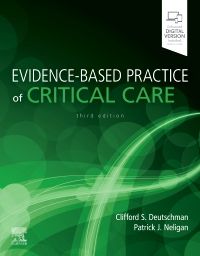Evidence-Based Practice of Critical Care, 3rd Edition
Approach any critical care challenge using a practical, consistent strategy based on best practices with Evidence-Based Practice of Critical Care, 3rd Edition. Unique, question-based chapters cover the wide variety of clinical options in critical care, examine the relevant research, and provide recommendations based on a thorough analysis of available evidence. Drs. Clifford S. Deutschman and Patrick J. Nelligan, along with nearly 200 critical-care experts, provide a comprehensive framework for translating evidence into practice, helping both residents and practitioners obtain the best possible outcomes for critically ill patients.
Approach any critical care challenge using a practical, consistent strategy based on best practices with Evidence-Based Practice of Critical Care, 3rd Edition. Unique, question-based chapters cover the wide variety of clinical options in critical care, examine the relevant research, and provide recommendations based on a thorough analysis of available evidence. Drs. Clifford S. Deutschman and Patrick J. Nelligan, along with nearly 200 critical-care experts, provide a comprehensive framework for translating evidence into practice, helping both residents and practitioners obtain the best possible outcomes for critically ill patients.
Key Features
- Covers a full range of critical care challenges, from routine care to complicated and special situations.
- Helps you think through each question in a logical, efficient manner, using a practical, consistent approach to available management options and guidelines.
- Features revised and updated information based on current research, and includes all-new cases on key topics and controversies such as the use/overuse of antibiotics, drug resistance in the ICU, non-invasive mechanical ventilation, frequency of transfusions, and duration of renal replacement therapies.
- Provides numerous quick-reference tables that summarize the available literature and recommended clinical approaches.
- Enhanced eBook version included with purchase. Your enhanced eBook allows you to access all of the text, figures, and references from the book on a variety of devices.
Author Information
| ISBN Number | 9780323640688 |
|---|---|
| Main Author | By Clifford S. Deutschman, MS, MD, FCCM and Patrick J. Neligan, MA, MB, FRCAFRCSI |
| Copyright Year | 2020 |
| Edition Number | 3 |
| Format | Book |
| Trim | 216w x 276h (8.50" x 10.875") |
| Illustrations | Illustrated |
| Imprint | Elsevier |
| Page Count | 688 |
| Publication Date | 5 Sep 2019 |
| Stock Status | IN STOCK |
1. Has Evidence-Based Medicine Changed the Practice of Critical Care?
2. Do Protocols/Guidelines Actually Improve Outcomes?
3. What Happens to Critically Ill Patients After They Leave the ICU?
4. Can Post-ICU Syndrome (PICS) Be Prevented or Treated?
5. How Have Genomics Informed Our Understanding of Critical Illness?
Section 2: Basic Respiratory Management and Mechanical Ventilation
6. Is Oxygen Toxic?
7. What is the Role of Noninvasive Respiratory Support and High Flow Nasal Cannula in the Intensive Care Unit?
8. What Is the Role of PEEP and Recruitment Maneuvers in ARDS?
9. What Is the Best Way to Wean and Liberate Patients from Mechanical Ventilation?
10. How Does Mechanical Ventilation Damage Lungs? What Can Be Done to Prevent It?
Section 3: Non-ARDS and Non-Infectious Respiratory Disorders
11. How Should Exacerbations of COPD Be Managed in the Intensive Care Unit?
12. Is Diaphragmatic Dysfunction a Major Problem Following Mechanical Ventilation?
Section 4: ARDS
13. ARDS--Are the Current Definitions Useful?
14. What Are the Pathologic and Pathophysiologic Changes That Accompany ARDS?
15. What Factors Predispose Patients to Acute Respiratory Distress Syndrome?
16. What Is the Best Mechanical Ventilation Strategy in ARDS?
17. Is Carbon Dioxide Harmful or Helpful in ARDS?
18. Does Patient Positioning Make a Difference in ARDS?
19. Do Inhaled Vasodilators in ARDS Make a Difference?
20. Does ECMO Work?
21. What Lessons Have We Learned from Epidemiologic Studies of ARDS?
22. What Are the Long Term Outcomes After ARDS?
Section 5: General Critical Care Management
23. How Do I Approach Fever in ICU and Should Fever Be Treated?
24. What Fluids Should be Given to the Critically Ill Patient? What Fluids Should be Avoided?
25. Should Blood Glucose Be Tightly Controlled in the Intensive Care Unit?
26. Is There a Role for Therapeutic Hypothermia in Critical Care?
27. How Do I Manage the Morbidly Obese Critically Ill Patient?
28. How Do I Safely Transport the Critically Ill Patient?
29. What Are the Causes of, and How Do I Treat, Critical Illness Neuropathy/Myopathy?
Section 6: Sepsis
30. What is Sepsis?
31. How Do I Identify the Patient with “Sepsis?
32. Is There Immune Suppression in the Critically Ill Patient – Pro?
33. Is There Immune Suppression in the Critically Ill Patient – Con?
34. Does the Timing of Antibiotic Administration Matter in Sepsis?
35. What Is the Role of Vasopressors and Inotropes in Septic Shock?
36. Does Monitoring the Microcirculation Make a Difference in Sepsis? Outcome?
37. Are We Getting Any Better at Diagnosing Sepsis?
38. Do the Surviving Sepsis Campaign Guidelines Work?
39. Has Outcome in Sepsis Improved? What Works? What Does Not?
Section 7: Persistent Critical Illness
40. What Happens to the Autonomic Nervous System in Critical Illness?
41. Is Persistent Critical Illness a Syndrome of Ongoing Inflammation/Immunosuppression/Catabolism?
Section 8: Infection
42. How Do I Optimize Antibiotic Use in Critical Illness?
43. How Do I Identify Pathologic Organisms in the 21st Century?
44. How Do I Diagnose and Manage Catheter-Related Bloodstream Infections?
45. How Do I Manage Central Nervous System Infections (Meningitis/Encephalitis)?
46. How Can Biomarkers Be Used to Differentiate Between Infection and Non-infectious Causes of Inflammation?
47. What is Ventilator-Associated Pneumonia? How Do I Diagnose It? How Do I Treat It?
Section 9: Hemodynamic Management
48. What Is the Role of Invasive Hemodynamic Monitoring in Critical Care?
49. Does the Use of Echocardiography Aid in the Management of the Critically Ill?
50. How Do I Manage Hemodynamic Decompensation in a Critically Ill Patient?
51. What are the Best Tools to Optimize the Circulation?
52. How Should Cardiogenic Shock Be Managed (Including Assist Devices)?
Section 10: Cardiovascular Critical Care
53. How Do I Manage Acute Heart Failure?
54. How Do I Diagnose and Manage Myocardial Ischemia in the ICU?
55. How Do I Prevent or Treat Atrial Fibrillation in Postoperative Critically Ill Patients?
Section 11: Kidney Injury & Critical Illness
56. How Do I Rapidly and Correctly Identify Acute Kidney Injury?
57. What Is the Role of Renal Replacement Therapy in the Intensive Care Unit?
58. What is the Value of Non Dialytic Therapy in Acute Kidney Injury?
Section 12: Metabolic Abnormalities in Critical Illness
59. How Should Acid-Base Disorders Be Diagnosed?
60. Is Hyperchloremia Harmful?
61. Dysnatremias--What Causes Them and How Should They Be Treated?
62. Why Is Lactate Important in Critical Care?
63. How Does Critical Illness Alter Metabolism?
Section 13: Neurological Critical Care
64. How Should Traumatic Brain Injury Be Managed?
65. How Should Aneurysmal Subarachnoid Hemorrhage Be Managed?
66. How Should Acute Ischemic Stroke Be Managed in the Intensive Care Unit?
67. How Should Status Epilepticus Be Managed?
Section 14: Nutrition, Gastrointestinal & Hepatic Critical Care
68. When and How Should I Feed the Critically Ill Patient?
69. What Does Critical Illness Do to the Liver?
70. How Do I Manage a Patient With Acute Liver Failure?
Section 15: Endocrine Critical Care
71. Is There a Place for Anabolic Hormones in Critical Care?
72. How Do I Diagnose and Manage Acute Endocrine Emergencies in the ICU?
73. What Is the Current Role for Corticosteroids in Critical Care?
Section 16: Trauma, Surgery, Obstetrics & Environmental Injuries
74. How Should Trauma Patients Be Managed in the Intensive Care Unit?
75. What Is Abdominal Compartment Syndrome and How Should It Be Managed?
76. How Should Patients with Burns Be Managed in the Intensive Care Unit?
77. What Is the Best Approach to Resuscitation in Trauma?
78. How Do I Diagnose and Treat Major Gastrointestinal Bleeding?
79. How Should the Critically Ill Pregnant Patient Be Managed?
80. How Do I Diagnose and Manage Patients Admitted to the ICU After Common Poisonings?
Section 17: Hematology Critical Care
81. When Is Transfusion Therapy Indicated in Critical Illness and When Is It Not?
82. Is There a Role for GM-CSF and/or Erythropoietin in Critical Illness?
83. What Anticoagulants Should be Used in the Critically Ill Patient? How Do I Choose?
Section 18: Critical Care Resource Use and Management
84. Is There a Better Way to Deliver Optimal Critical Care Services?
85. How Do Critical Care Pharmacists Contribute to Team Based Care?
86. What Is the Role of Advance Practice Nurses and Physician Assistants in the ICU?
Section 19: Patient Suffering and Other Ethical Issues
87. Do the Guidelines for Brain Death Determination Need to Be Revised?
88. How Do I Diagnose, Treat, and Reduce Delirium in the Intensive Care Unit?
"The third edition can be recommended for effective tabular summary of data, excellent written content, and summary points in each chapter that add clarity to the intent of the authors."
-David J. Dries, MD (University of Minnesota Medical School) Doody's Review
Related Products
-
35% OFF
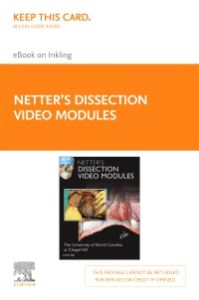 Online Resource
Netter's Dissection Video Modules (Retail Access Card)
Online Resource
Netter's Dissection Video Modules (Retail Access Card)University of North Carolina Chapel Hill and Frank H. Netter
Oct 2015
Special Price $117.64 $180.99 -
30% OFF
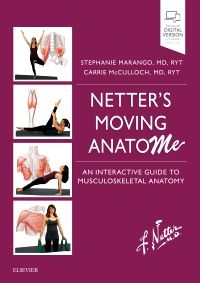 Book
Book
-
35% OFF
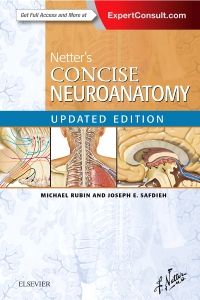 Book
Book
-
35% OFF
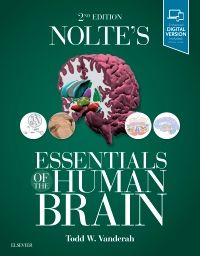 Book
Book
-
30% OFF
 Book
Nolte's The Human Brain in Photographs and Diagrams
Book
Nolte's The Human Brain in Photographs and DiagramsTodd W. Vanderah
Jan 2019
Special Price $44.79 $63.99 -
35% OFF
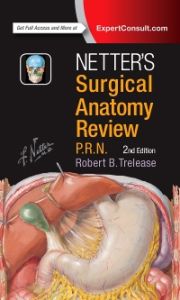 Book
Book
-
35% OFF
 Flash Cards
Flash Cards
-
35% OFF
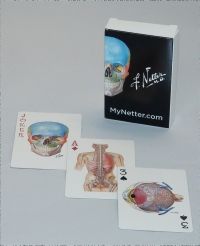 Flash Cards
Flash Cards
-
35% OFF
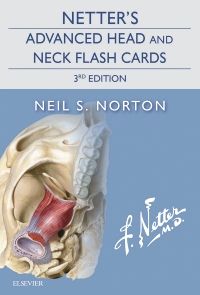 Flash Cards
Flash Cards
-
35% OFF
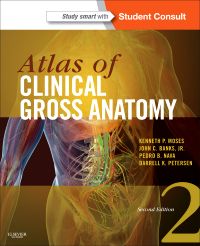 Book
Book




